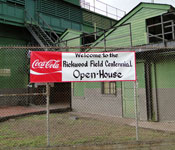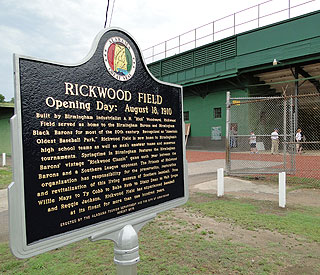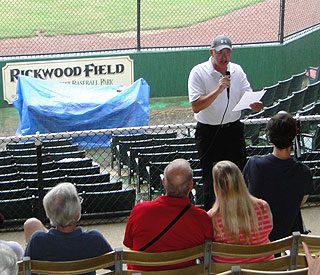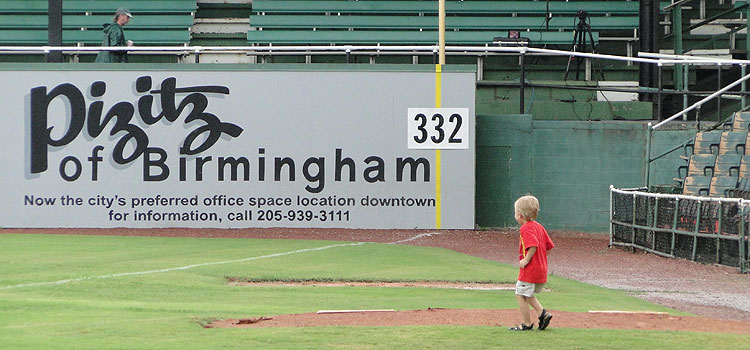
|
Dictionary definitions of the word “special” vary, but adjectives such as distinctive, distinguished, exceptional, extraordinary and unique are used to describe a word that definitely applies to a ballpark in Birmingham that is worthy of such superlatives.
The end result of $75,000 spent by A. H. "Rick" Woodward in 1910, the ballpark that still bears a mash-up of his name officially turned 100 on August 18, 2010. On that date, the old park’s caretakers, the aptly titled Friends of Rickwood, staged a four-hour afternoon Open House to coincide with the Field’s inaugural Opening Day. The program was preceded by the unveiling of a historical marker, the ballpark’s second, that was placed outside the first base gate. "From Willie Mays to Ty Cobb to Babe Ruth to Dizzy Dean to Walt Dropo and Reggie Jackson, Rickwood Field has experienced baseball at its finest for more than one hundred years," reads the final of five sentences the marker denotes the park's history with. The names of those players, and numerous other legends of the game, are often recited to explain why Rickwood Field is such a special place. And indeed, Rickwood’s grounds may be more hallowed than any other in baseball’s illustrious history, as when its first century of service was completed 103 men inducted into baseball immortality at Cooperstown had played in Birmingham in what was the minor league’s first concrete and steel structure when it opened. Thanks to the players Rickwood Field is undoubtedly distinguished and the stories of their feats are part of the park's lore. But so too are the lesser told tales, those that emit from the front office, fans and Friends, groups that were all well represented in Rickwood on its centennial birthday, and their mental nostalgia helps to define the word special as it relates to what the National Park Service classifies as the oldest baseball park in America. David Wininger is a lawyer who lives in the Birmingham suburb of Homewood. But there’s no doubt he feels most at home when he’s at Rickwood. If memory serves him correct, he saw his first game there in 1948, a year in which a Rickwood record 445,926 fans attended Barons games and a 16-year old Willie Mays made his debut for the Black Barons, who drew hundreds of thousands more to the park they shared with their white counterparts.
When recounting his most memorable moment at Rickwood, Wininger doesn’t detail some heroic feat that occurred on its field. His is a father-son memory with a twist: Wininger, now on the Friends of Rickwood board of directors, makes at least one visit a month to the ballpark year round and “every time I come I see that spot where we were when the two fathers apprehended us.” Willie J. Lee is one of the many local legends that still frequent Rickwood. Now 75, he grew up and still lives nearby. In his youth, Lee can remember watching Ernie Banks and other great Negro League ballplayers, many of whom toiled in relative anonymity, at Rickwood, which didn’t become officially desegregated until 1964. However, on April 2, 1954, section 597 of the Birmingham city code, which barred whites and blacks from playing together, was ignored by the Brooklyn Dodgers and Milwaukee Braves, a pair of teams that featured black ballplaying stars in Jackie Robinson and Hank Aaron, when they staged an exhibition at Rickwood Field. As he often did back then, Lee climbed the fence to get in. “I started in left field and when I got over the fence Don Newcombe was down there warming up and he saw me and went and got a policeman and they put me out of the park,” he reminisced. But not to be deterred, Lee headed to right field, climbed the fence there and watched the game. Two years later, Lee would get paid to enter Rickwood Field, although it was as a visitor in his hometown ballpark. The Kansas City Monarchs signed him following a tryout in 1956. That was after he had played one game as a Black Baron. Alas, that game was in Mobile. So Lee, the hometown kid who now resides in Pratt City, is remembered outside of his local ballpark, as are many other past players, with an engraved brick bearing his tenure with the Black Barons’ arch rival and enemy, the Monarchs, for whom he played from 1956-58. Such is the irony of being a ballplayer, that a man of Birmingham vintage like Lee can be forever tied to a team from Kansas City in a public display at Birmingham's landmark ballpark. John T. Bird has lived his life in a pair of iron cities. He grew up in Pittsburgh two miles from Forbes Field and in 1966 moved to a Birmingham suburb about 10 miles from Rickwood Field. Pittsburgh has long been known as the “Steel City” and Birmingham was deemed the “Pittsburgh of the South.” That was because each once had an iron industry based economy, not because Rickwood was modeled after Forbes, which it in fact was. In the 1960s Bird managed to go to many games in both ballparks, but Birmingham’s was the better of the two when it came to free souvenirs, aka foul balls. At Rickwood, “it's pretty easy to catch a baseball,” said Bird, “which is a really big deal for a sixth grader or seventh grader. I caught a lot of baseballs.” Thanks to a pair of intimate ballparks, Bird caught the baseball fever during his formative years. Art Clarkson spent seven of his “living and breathing” Rickwood.
The year before Clarkson made his first visit to Rickwood, but the ballpark was locked. So he entered it the same way Willie J. Lee did a quarter century before, and the then future Barons owner was awestruck by the experience. “I remember when I first climbed over the fence in 1979,” Clarkson recalled 31 years later, “walking to home plate and I said 'By God, Babe Ruth actually stood here.'” After a five-year absence, the Barons returned to Rickwood Field in 1981 with Clarkson at the helm, serving as CEO and General Manager while embracing “the challenge of making sure every day, day in day out, I could actually keep the place going.” He did so through the 1987 season. "Much as I love the place, it's coming apart," Clarkson was quoted as saying in a New York Times article dated August 16, 1987. So Clarkson, then 45-years old, moved his team 20 miles to the south and into a new $14.5 million stadium in the suburb of Hoover, where they remain to this day. Except for one day, that is. That day is the Rickwood Classic, which began in 1996 and has been held ever since. Once a year, usually in late May or early June, the Barons play an official Southern League game in Birmingham at Rickwood Field, thus qualify it as the world’s oldest professional ballpark. The 15th edition of the Classic was on June 2, 2010 and 9,448 fans filled the 10,800-seat ballpark for the game, won by the visiting Tennessee Smokies, 8-7, in extra innings, which seemed appropriate as Rickwood has truly thrived in its extra innings. When the Barons left Rickwood in 1987 its fate was uncertain, but certainly gloomy. Somehow the old ballpark avoided the wrecking ball long enough for a grassroots organization to form five years later and from their humble, yet ambitious, beginnings, the Friends of Rickwood have restored the ballpark to its golden era glory. The Friends’ Executive Director is David Brewer, although perhaps a more appropriate title for him would be Rickwood’s Chief Ambassador. As the ballpark’s sole paid employee, Brewer spends 60 hours a week caring for and promoting Rickwood Field. Brewer moved to Birmingham in 1980 and later earned a master’s degree in history, with a concentration in historic preservation, at UAB. Since 1998 he has been to Rickwood what tires are to a car, which is an analogous way to say essential to the park’s forward progress. Thirteen days before Rickwood’s 100th birthday bash, Brewer was in Atlanta to make a 20-minute presentation at the Society for American Baseball Research (SABR) convention. A few days later, on a Sunday afternoon, a group of about 40 SABR attendees made the 150-mile pilgrimage to Rickwood and Brewer was there to welcome them to his workplace…and passion. “For all of us, it's something we're emotionally connected to,” says Brewer of Rickwood Field, “and I feel quite fortunate to be a part of it.” So too did Clarkson, who came all the way from Wisconsin to be a part of Rickwood’s centennial festivities. “It's hard not to get wrapped up in all this nostalgia here,” said Clarkson, who became Chief Operating Officer of the Green Bay Blizzard, an arena football team, on April 4. “I can remember taking my kids, when they were three, four-years old, after the season was over,” Clarkson said wistfully of his Barons’ ownership days, “out on a Sunday and let them run around on the bases. It was just cool.” Clarkson sold his share in the Barons in 1990 and when asked if he thought Rickwood would be anything more than a memory two decades later he simply responded, “truthfully, no.” The Birmingham News labeled Rickwood a “model plant,” as stadiums were referred to near the turn of the 20th century, on the day it opened in 1910 and 100 years later it remains a model that preservations can marvel at thanks to a special group of Friends and their fundraising ($2 million to date) efforts, with fans and players being the primary beneficiary. Amateur teams aplenty, from travel team tournament participants to nearby Miles College, ensure that Rickwood’s field needs frequent manicuring. That keeps Brewer, and the volunteer force he coordinates, quite busy. The playing field looked pristine during the park’s Centennial Open House and was scheduled to be used by college kids from a local wood bat summer league. But at 3:37 –about the exact time of the first thrown pitch in ballpark history exactly 100 years prior – it was announced that the three-inning exhibition was postponed due to a storm that arrived 15 minutes after the centennial ceremonies had begun at 3:00. The downpour didn’t dampen the enthusiasm of those in attendance. It just claimed one game in a place where thousands have yet to be played and many memories can still be made. And that makes Rickwood Field, at 100 years and counting, just a little more special each day.
What makes Rickwood such a fascinating place is its history and the recollections of those who have been a part of a century of memories. I touched on the later above, but Allen Barra may have authored the definitive historical account of Rickwood with his book, Rickwood Field: A Century in America's Oldest Ballpark, which was published just three weeks before the ballpark turned three digits old. Of course, Barra's book and my writings about Rickwood wouldn't be possible if not for the Friends of Rickwood. Their Web site, www.rickwood.com, is an excellent source for info about America's Oldest Baseball Park. Rick Woodward proved if you build it they will come. The Friends of Rickwood proved that if you preserve it, they still will. Because of their efforts, people like myself, who didn't "discover" Rickwood until 2003, can enjoy a national treasure that ranks right up there with Fenway and Wrigley, the two active ballparks closest in age (est. 1912 and 1914, respectively) to Rickwood. The French-born American historian Jacques Barzun once famously opined "whoever wants to know the heart and mind of America had better learn baseball." I say whoever wants to know about the history of the American ballpark had better visit Birmingham. - Graham Knight, on August 21, 2010
| ||||||||||||||||||||

 Rickwood Field's second century began with a newly minted marker commemorating its first
Rickwood Field's second century began with a newly minted marker commemorating its first
 Former Barons principal owner Art Clarkson was one of Rickwood's many Friends to address the crowd during the ballpark's 100th birthday celebration
Former Barons principal owner Art Clarkson was one of Rickwood's many Friends to address the crowd during the ballpark's 100th birthday celebration

